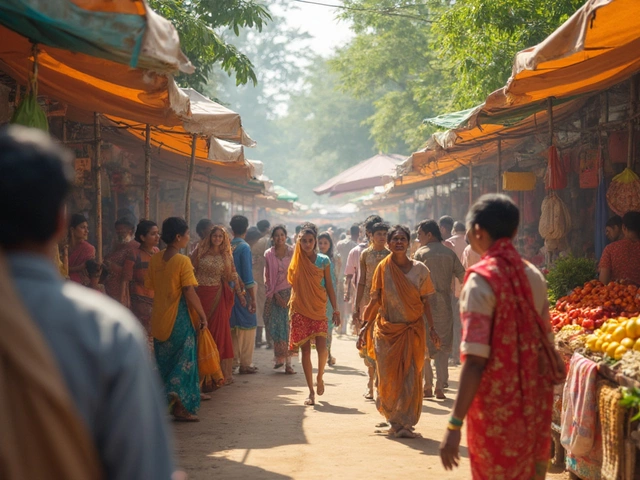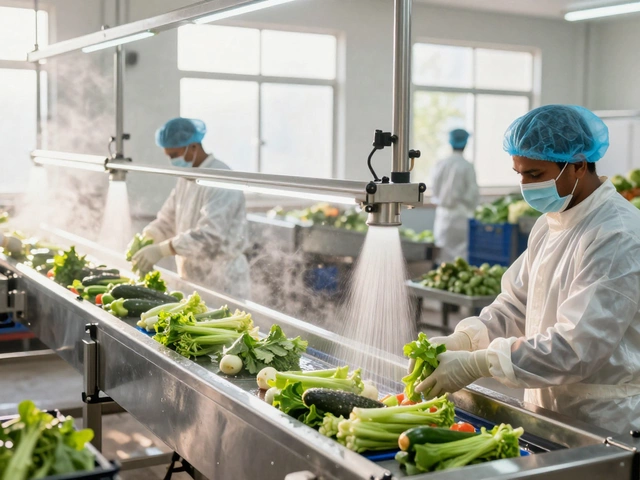Forget what you’ve heard—no country is truly plastic free. That dream vision where nobody touches a water bottle or wraps food in cling film? We’re not there yet. But some countries are trying crazy hard to ditch plastic, and you can see wild differences depending on where you land.
The main thing to remember: plastic-free almost never means zero plastic. It usually means countries banned single-use plastic bags, straws, or cups, and they’re putting serious pressure on companies to use better options. That’s a big deal for plastic manufacturing companies, who’ve had to scramble to keep up with rules that change almost every year.
Want to live or travel somewhere where plastic is seriously out of fashion? Places like Rwanda or Bangladesh come close, but even there, it’s not spotless. Local businesses face strict penalties for breaking the rules, and you won’t catch locals with a regular grocery bag.
- What Does Plastic Free Actually Mean?
- Are Any Countries Really Plastic Free?
- Countries with the Strictest Plastic Bans
- Plastic Manufacturing Companies: Navigating New Laws
- What We Can Learn from Top Performers
- Tips for Businesses and Travelers in Plastic-Free Zones
What Does Plastic Free Actually Mean?
When people hear "plastic free," they often picture entire countries where you can’t find a crumb of packaging, no water bottles, not even a toothbrush made with plastic. That’s not how it works in real life. Being plastic free doesn’t mean banning every bit of plastic. Instead, it means cutting out the worst offenders—the single-use plastics that pile up in landfills and the ocean.
Most places chasing the "plastic free" dream are cracking down on things like:
- Plastic shopping bags (the ones you grab at the store)
- Plastic straws, stirrers, and cutlery
- Single-use cups, plates, and takeaway containers
- Plastic bottles, especially small water bottles
There's real science behind why these items matter. According to a 2023 report by the United Nations Environment Programme, single-use plastics make up more than one-third of all plastic made worldwide. That means cutting out just these few items can shrink a country’s plastic waste fast.
“Plastic free” also depends on laws. Some countries put heavy taxes on plastic bags. Others outright ban them. Local companies—especially plastic manufacturing companies—have to switch up what they make to stay legal. And some governments even force shops to offer alternatives like paper, jute, or reusable fabric bags right at the counter.
When you see a "plastic free" label on a product or region, it usually just means the big problem plastics are gone—not that every product is 100% free of the stuff. If you want to go plastic free at home, the real challenge is in everyday swaps: bring your own bags, use refillable bottles, and look for foods without plastic packaging.
Are Any Countries Really Plastic Free?
The honest answer: no country has totally kicked its plastic habit. Even in places where single-use plastics are banned, you’ll still spot some kind of plastic in daily life. Think hospital supplies, electronics, or hidden packaging. That’s not just a guess. In 2024, the UN actually published a global report showing that no nation had completely wiped out plastic. Some do a much better job at reducing it, though.
The countries popping up most when people talk about plastic bans are Rwanda, Bangladesh, and a chunk of European nations like Germany and France. But even the strictest rules leave loopholes, or at least ‘special use’ permissions—for example, food safety wrappers or medical stuff. Want a real-life stat? Check the table below:
| Country | Ban Start Year | What’s Banned | Plastic Usage Reduction |
|---|---|---|---|
| Rwanda | 2008 | Plastic bags, some packaging | Estimated 70% drop |
| Bangladesh | 2002 | Thin plastic bags | About 65% drop |
| France | 2016 | Bags, plates, cups | 30-35% drop |
| Kenya | 2017 | Plastic bags | 80-90% drop |
Pretty solid numbers, right? But plastics don’t magically disappear everywhere. Illegal smuggling is still a thing (especially in border towns) and tourists often get caught sneaking in disposable packaging. In Rwanda, for instance, customs might actually search your luggage for plastic bags. That’s not a joke.
So, while a few countries are leading the plastic free charge, total freedom from all plastics isn’t real…yet. But at least now you know where the main hotspots are, and why plastic manufacturing companies watch these regions like a hawk. They need to constantly update products to keep up with the latest bans and rules.
Countries with the Strictest Plastic Bans
Let’s call it what it is—if you’re looking for hardcore anti-plastic action, a few countries are truly walking the talk. They’re not just talking about recycling or cutting back, they’ve made laws with teeth. Break these rules, and you could get hit with some serious fines or even jail time.
Take Rwanda. It’s probably the world’s poster child for going after single-use plastics. Since 2008, plastic bags have been flat-out illegal there. Airport security will literally check your bags for sneaky plastic wrappers. If you get caught, you’ll pay between $60-$150, and repeat offenders might even end up behind bars. It sounds intense, but the capital, Kigali, is now one of the cleanest cities on the planet.
Botswana, Kenya, and Tanzania have followed Rwanda’s lead. In Kenya, the laws since 2017 are no joke. Bring a plastic bag into the country? You could face fines of up to $40,000 or spend four years in jail. Not kidding. Shops have switched to paper, cloth, or reusable options fast.
Bangladesh banned plastic bags as early as 2002 after plastic waste clogged drainage and flooded huge parts of Dhaka. Now, carrying single-use plastic bags there is a big no-no, with penalties that keep folks in line. In India, there’s a patchwork of state laws, but big cities like Mumbai and Delhi have super tough bans, especially on single-use items like cutlery, plates, and cups. You’ll see almost everyone using metal or plant-based containers.
It’s worth calling out the European Union too. As of July 2021, all member countries are supposed to ban single-use plastic plates, cutlery, straws, and polystyrene containers. There’s less drama, but tons of pressure on businesses to switch fast because people are watching and reporting violations all the time.
Here’s a quick comparison of what some of the strictest countries have managed with their plastic free rules:
| Country | Year Ban Started | Main Items Banned | Penalties |
|---|---|---|---|
| Rwanda | 2008 | Plastic bags, packaging film | $60-$150 fine or jail time |
| Kenya | 2017 | Plastic carrier bags | Up to $40,000 or 4 years jail |
| Bangladesh | 2002 | Single-use plastic bags | Fines, confiscation |
| EU (multiple countries) | 2021 | Single-use straws, cutlery, plates | Vary by country, mostly fines |
| India (selected cities/states) | 2018-2023 | Single-use items, bags | Fines, business closures |
These bans don’t just sound tough—they actually forced stores, restaurants, and manufacturers to change how they do business. Most people in these countries now carry their own reusable bags, bottles, and containers, and plastic waste on the street is way down compared to places without such rules. If you’re curious where to look for real progress, it’s right here.

Plastic Manufacturing Companies: Navigating New Laws
If you run a plastic manufacturing company today, you basically need a roadmap just to keep up with the law. Countries tossing out bans on single-use plastics isn’t just hype—it’s now a daily headache for manufacturers figuring out what’s legal right now and what’s banned next year.
For example, the European Union banned many single-use items like plates, cutlery, and straws in 2021. In India, there’s a strict prohibition on producing or using single-use plastics, kicking in from July 2022. Kenya enforces such harsh penalties that a plastic bag can land business owners in jail. And there’s Rwanda, where plastic bags have been illegal since 2008—it’s rare to find any floating around, and customs will confiscate them at the border.
Plastic manufacturing companies can’t afford to ignore these shifts. Here’s what most of them have to juggle:
- plastic free product development (think: compostable packaging or sturdy reusable alternatives)
- Keeping track of country-specific bans—some only ban bags, others include straws, takeout containers, and more
- Switching to new materials like bioplastics or recycled plastics
- Extra compliance costs, like audits and eco-certificates
- Finding local suppliers or opening factories in countries with less strict rules (but this can backfire if the global market bans your product)
Check out this table to see some real examples of country laws and what they mean for manufacturers:
| Country | Year Major Ban Started | Main Banned Items | Penalties for Companies |
|---|---|---|---|
| Rwanda | 2008 | Plastic bags, packaging film | Fines, closures, even jail time |
| Kenya | 2017 | Plastic carrier bags | Up to $40,000 fine or 4 years jail |
| India | 2022 | Single-use plastics (cutlery, bags, straws) | Seizure, fines, business closure |
| EU | 2021 | Single-use cutlery, plates, straws, cotton buds | Fines, product recalls |
One trick bigger manufacturers use is working closely with governments or joining industry groups. If you know what’s in the pipeline, you can overhaul your products before the ban hits. Plus, showing off your green credentials can actually win you new business as more countries demand strict compliance.
If you’re a smaller business, team up with local experts, double-check all new shipments, and keep your paperwork sorted—surprise inspections are common. And if you ignore the rules? It’s rarely worth the risk. The days of dumping cheap plastic everywhere are winding down fast.
What We Can Learn from Top Performers
If you want to see what actually works in fighting plastic waste, look at the countries who’ve cracked down hardest. Rwanda stands out—plastic bags are banned, full stop. If you try to sneak one in at the airport, they’ll take it. Shops hand out sturdy paper or reusable bags, and most packaging is totally different than what you’ll see in the West.
Bangladesh banned thin plastic bags way back in 2002, after streets flooded during monsoon season (plastic bags blocked the drains). It made a night-and-day difference. Other countries, like Vanuatu, have outlawed plastic straws, plates, and polystyrene takeaway boxes. It’s not just talk—if you get caught breaking these rules, you’ll pay serious fines or even go to jail. That shakes up how both shoppers and big plastic manufacturing companies do business.
So what’s really driving the change? Three things come up again and again:
- Tough Laws: Actual bans with strict penalties. Not "try your best," but real rules with teeth.
- Visible Enforcement: Customs checks, police spot checks, and education at schools and markets.
- Community Buy-In: When locals and business owners support the rules, they stick—no need for constant crackdowns.
Here’s some quick stats on top performers:
| Country | Year Plastic Ban Started | Major Banned Plastics | Result |
|---|---|---|---|
| Rwanda | 2008 | Bags, packaging | Cleaner public spaces, less drain blockage |
| Bangladesh | 2002 | Thin bags | Fewer floods, cleaner cities |
| Vanuatu | 2018 | Straws, plates, packaging | Less litter on beaches |
| Kenia | 2017 | Bags | Drastic drop in plastic bag use |
What about companies? Top performers often help local businesses transition. In Rwanda, paper mills popped up to replace plastic packaging jobs. Sri Lanka, after banning single-use plastics in 2017, pushed farmers back to using old-school leaf wrappers that work just as well. It’s never about banning and running—it’s about opening the door to new jobs and ways of doing things.
If there’s one clear lesson: real change happens when governments mean business, communities care, and there’s support for everyone to make the switch.
Tips for Businesses and Travelers in Plastic-Free Zones
If your business depends on packaging, or you’re just heading to a country that’s cracking down on plastic, you can’t wing it. Places like Rwanda, Kenya, and the EU have some of the world’s toughest bans—get caught with the wrong bag and you may face fines or worse (yes, some countries do jail time!).
Check out this real-world data on the policies and penalties in a few plastic-free hotspots:
| Country | Banned Items | Penalties |
|---|---|---|
| Rwanda | All plastic bags, some packaging | $50-$150 fine, jail for repeat offenses |
| Kenya | Plastic bags | Up to $40,000 fine, up to 4 years in jail |
| Bangladesh | Polyethylene bags, thin plastic | Up to $70 fine, confiscation |
| European Union | Single-use plastics (cutlery, straws, etc.) | Varies by country: fines or sales bans |
So what’s the playbook if you’re a company or a traveler in one of these spots? Here’s what actually works:
- plastic free means more than just skipping straws—read local laws before you arrive. Some airports in Africa have bins at customs for tossing banned bags.
- Business owners: stock up on paper, cloth, or compostable bags (with a clear eco-label if possible—inspectors really check for this).
- Restaurants and food sellers: many places accept only plant-based or recyclable packaging. Source these in advance so you’re not caught short.
- If you’re a traveler, pack reusable bags, bottles, cups, and cutlery. You’ll avoid fines and actually make life easier every day.
- Want to ship products? Double-check your packaging list. Governments sometimes confiscate goods over non-compliant wrapping—even for imports.
Let’s be honest, locals and expats both mess up sometimes. But fines are real. For plastic manufacturing companies, it’s smart to offer eco-friendly products designed for each market. In 2024, 80% of Rwandan shops only accepted alternatives to plastic bags—a sharp jump from five years ago. Travelers who didn’t get the memo had to scramble at airports for a cloth bag or risk getting hit in the wallet.
If you want to stand out, make sustainability your selling point. Local governments love companies that actually help them stick to their bans—and so do customers who’ve gotten used to life without plastic.





